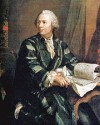Leonhard Euler, a most prolific mathematician born in 1707 in Switzerland, is considered one of the founders of pure mathematics and analysis. He made significant contributions to nearly every branch of mathematics – geometry, calculus, trigonometry, algebra, number theory – as well as to optics, astronomy, cartography, mechanics, acoustics, weights and measures, and even the theory of music. In addition to his many discoveries, he established much of the notations we use today, such as e (the base of the natural logarithm, also known as Euler’s number), i (the imaginary unit), f(x) (the functional value), π (the ratio of a circle’s circumference to its diameter), ∑ ( for summations), and the use of a, b and c as constants, and x, y and z as unknowns.
Although his early education was focused on theology and related subjects, Euler’s earliest mathematical training was provided by his father, Paul Euler, a Protestant priest and an amateur mathematician. Paul Euler introduced him to Christoff Rudolf’s Algebra, an exceedingly difficult text for such a young boy. Euler’s extraordinary ability in mathematics and physics were recognized by Johann Bernoulli, then professor of mathematics at the University of Basel. He encouraged Euler to study more advanced mathematical books and gave him private lessons in mathematics every Saturday afternoon. At the age of nineteen, he submitted two dissertations to the Paris Academy of Science, one on the masting of ships, and the other on the science of sound. These works marked the beginning of his splendid research career in mathematics and science.
Euler was gifted with a phenomenal memory and prodigious powers of mental calculation. He could recite from memory the entire text of Virgil’s Aeneid (approximately 400 pages), being able to recall the first and last sentences on any page. He also possessed eloquent writing skill, and his clear, simple language made his work accessible to experts and students alike. He published almost 900 original research papers, memoirs, and 25 books and treatises on mathematical and physical sciences. His famous Letters to a German Princess – Anahalt-Dessau, the 15-year old niece of the King of Prussia – on different subjects form one of the most remarkable and popular science books.
Euler is admired not only for his genius, but also for his character. He was open and cheerful-minded, uncomplicated, tolerant, honest, humorous and sociable. He generously gave away new discoveries and insights and let others take part in the process of discovery. For example, he put on hold his already extensive work on hydrodynamics so that his friend Daniel Bernoulli, who was working on the same topic, could complete and publish his own Hydrodynamica first.
Though Euler chose mathematics as a profession rather than theology, his early religious training played a big role in both his professional and family life. His equanimity and perseverance through multiple tragedies are truly a testimony of his religiousness. Even his total blindness (for the last seventeen years of his life) could not impede the flood of his mathematical output. His modest remark, when he lost his vision, was, “Now I will have fewer distractions.” Amazingly, it was during this time of total blindness that he proved some of his most important theorems and wrote some of his most influential books. His unwavering faith in God under all circumstances was his strength at all times of his life. He said, “If only we were to ponder this doctrine (Scriptures) with the appropriate attention and apply it to ourselves, we would submit to the will of God under all circumstances without difficulty and even with pleasure, and in this way attain true happiness”.
Much of Euler’s theology may be learnt from his Letters to a German Princess and his Defense of the Divine Revelation against the Objections of the Freethinkers. The following two statements reveal his admiration for God and Holy Scriptures: “The government of this universe will, likewise, ever inspire us with the most sublime idea of the sovereign wisdom and goodness of God.” Concerning the scriptures, he wrote, “The Holy Scripture not only provides those who are seriously concerned with the improvement of their hearts with the most powerful means to that end, but that it also leads them in time to a greater knowledge of God”.
Thus Euler is admired not only for his beautiful equation (eπi +1 = 0), but also for his inspiring perseverance and unwavering faith in God.

